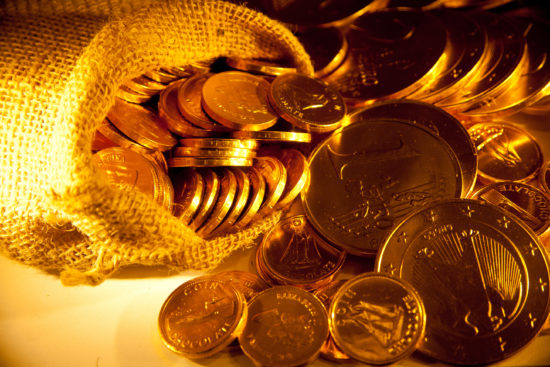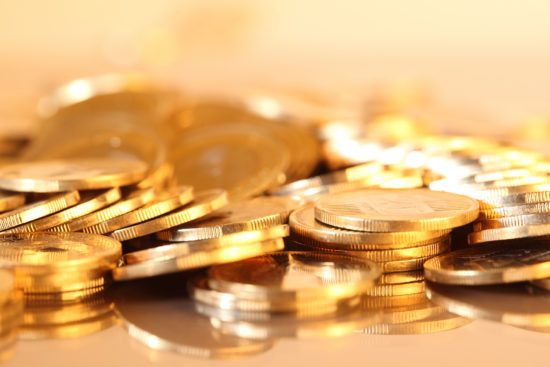There are many different types of gold a person can own, so there are many different ways you could care for your precious metal. Investors hold gold bullion as a form of wealth protection, and this can mean storing it in your home for many years. It’s important to keep this gold in the best possible condition, preserving its value and shine. When the time comes to reap the rewards of your investment, coin dealers and other precious metals investors are more likely to buy clean and cared-for gold.
Some people keep collections of gold coins for their collectible value. Numismatic coins are defined as rare or valuable coins that have value beyond the number minted, or more than the metal content of the coin. Where gold bullion coins are priced based on the quantity and quality of metal, collectible coins have a more complicated value. They might be ancient coins with great historical significance or rare variations that are no longer minted. Collectible coins require different care and cleaning as compared to bullion coins, therefore take care in differentiating between the two.
Arguably the most common way for anyone to own gold is in the form of gold jewelry. Chains, rings, earrings, and other cosmetic adornments have been made using the precious metal gold for centuries. In fact, gold jewelry makes up more than 50% of global demand for this precious metal. With so many different reasons to buy gold in 2020, it’s important to be informed on the different ways you can clean the rare metal. Read on to discover how to care for your gold bullion, collectible coins, and jewelry.
How to Clean Gold
Gold comes in many different shapes and forms, and these items need to be cleaned in different ways. You cannot treat an old and valuable gold coin in the same way you’d care for cold bullion or a precious necklace. Caring for your gold, whether it’s an investment or a keepsake, means proper storage, handling, and cleaning. Most gold ownership is a product of a huge investment in both time and money. It’s in your own interest to take the best care of this asset as possible.
Most imperfections in gold coins are caused by incorrect handling. The first step in how to clean gold is actually preventing this damage in the first place. If you take proper care during handling, then the need to clean your gold will greatly decrease, you might not even need to do it at all! When discussing the cleaning of this valuable investment such as gold, it’s important to take the time to do it right. Cutting corners can devalue your gold, the last thing you want to happen during cleaning is damage.
Anytime that you’re handling and cleaning gold, it’s vital to be incredibly careful. Gold is a soft and highly malleable metal. A minor bump or scape can be enough to cause permanent imperfections on the metal’s surface. In minted gold coins this can mean that the high-quality finish, fine edges, and delicate details can be easily damaged. Some coin dealers prefer that investors and collectors never clean their gold, as doing so incorrectly can cause more damage than good.
Keep this fact in mind when considering cleaning your gold; it might be better to sell dirty and tarnished coins than risk devaluing your investment. This is especially true when dealing with ancient coins, which could be irreversibly damaged by heavy-handed cleaning. On the other hand, gold jewelry can benefit immensely from a deep and thorough cleaning. Metal jewelry can become dirty easily, and this affects their visual appeal. Regularly cleaning your gold jewelry can restore its shine and appearance, making it much more attractive overall.
We’re going to break down everything you need to know about the proper care and cleaning of gold. The methods for cleaning gold bullion, gold coins, and gold jewelry all differ, so we’ll explain each one in detail. Read on to discover how to properly handle your gold, where to store precious metals to prevent damage, and how to clean each type of gold the right way.

Gold is a precious metal that can stay untarnished on its own if kept safe.
How to Handle Gold for Cleaning
No matter which type of gold it is you own, there are a few guidelines you should follow whenever you handle the metal. These will keep the gold in it’s best possible condition and help prevent you from accidentally damaging your valuable investment. Any time you move, clean, or handle your gold, make sure you keep to these instructions to prevent scratches.
First, you should always wash your hands before touching precious metals. Clean your hands thoroughly with soap and water to remove dirt and oils from the surface of your skin. Otherwise, impurities on your hands can transfer to the surface of your coins or gold metal. Over time, this can lead to tarnishing and decay of the metal, so it’s something to be avoided. Simply wash and dry your hands before touching your gold investments, and this way you won’t have to worry.
To take the protection of your gold a step further, wear gloves when handling the metal. Soft cotton gloves can be easily purchased and will provide a protective barrier between your hands and the metal. Ideally, specialist coin-handling gloves won’t leave behind lint on the gold and will protect this soft metal from microscopic abrasions. They also prevent fingerprints from forming on the metal’s surface, so the shine won’t be obscured by unattractive smudges.
Some particularly fragile and old gold coins and jewelry may need to be handled with tweezers. You don’t need to worry about this for gold bullion, but a pair of plastic tweezers can help to pick up ancient gold coins without causing damage. Be sure not to use metal tweezers, as these can scratch the coin. It may be advisable to create a soft surface using a towel or cloth to use when handling your coins. This is helpful in case you drop a coin or other gold, so it won’t be damaged by the fall.
Caring for Your Gold Bullion
The best policy if you want to keep your gold bullion in top condition is actually to handle it as little as possible. When it is necessary, wearing soft cotton gloves and using a soft tablecloth as we outlined above is essential. Make sure your hands are properly cleaned, picking up your gold gently and with care. If you’re wondering how to clean your gold bullion; don’t. It’s not necessary to clean gold bullion as this can damage the mint finish.
Gold doesn’t corrode or tarnish. If you don’t interfere, this metal will remain bright and shiny forever. However, although you don’t need to clean gold, you do need to protect it from harm. You shouldn’t store gold together with silver, or any tarnished metal, as this can damage the gold. It’s best to store gold bullion on its own in airtight storage containers. You need to keep gold coins and bars in a sealed container to protect it from damage, but you also need to safeguard it from theft.
The main reason people own gold bullion is for wealth protection and storing it in your home is a great choice. Here, the precious metal is easily accessible and you don’t have to worry about third parties getting involved. Within its airtight capsule, we recommend storing gold in a secure safe. Make sure wherever you keep it, it is a moisture-free environment.
Alternatively, you can store your gold supply in a vault or safe deposit box. Here, you don’t need to worry about environmental conditions as these storage facilities are designed to protect the gold. So, it isn’t necessary to clean your gold bullion, but proper care and handling are still important. Always be careful not to damage your gold when you touch it, and store it in a secure location.
How to Clean Gold Coins
Silver coins can develop grime over time, as well as a layer of tarnish called a patina. There are many methods for cleaning silver coins using baking soda, lemon juice, and even a toothbrush to clean up the coin's surface. However, silver is a very different precious metal to gold. The tarnish and dirt can be removed without fearing damage to the metal, but the same cannot be said of gold coins. Gold is a much softer metal than silver, so it’s very easy to accidentally damage. Luckily, gold doesn’t tarnish, so the harsh cleaning methods often used on silver coins aren’t necessary for gold.
If you’re sure that cleaning your gold coin is necessary, you can use a gentle solution of clean water and dish soap. Soak the coins in the solution, and then rinse them in running water. Set the coins on a soft cloth to air dry; there’s no need to risk scratches by drying them with a towel. When dealing with rare coins, or especially old gold coins, it’s best to avoid cleaning them altogether. You could always try taking your gold for a professional coin cleaning, where experienced workers can restore shine and luster with a much smaller chance of losing value.
If you’re certain that it’s necessary to clean your gold coins, then you could try the following method. Remember, there’s always a risk of devaluing your gold coin during a cleaning, but if you decide that it’s worth it, here are a few steps to help restore that shine. You’ll need a plastic container or tub, clean warm water, and gentle dish detergent. You can also use a soft-bristled brush or soft cloth, just keep the warnings about scratches in mind. Never use any product containing abrasives to clean your gold coin.
- Fill your plastic container with clean, warm water. It might be a good idea to use distilled water if the tap water in your area has a high concentration of minerals.
- Add a few drops of washing-up liquid and mix to combine.
- Place your gold coin in the water solution and let it soak for several minutes.
- If necessary, you can use a soft brush or cloth to gently encourage dirt to break away.
- Rinse the coin in clean running water, and leave it on a soft towel to air dry.
How to Clean Gold Jewelry
Gold jewelry is the type of gold most people are likely to have in their homes. Necklaces and other adornments made from gold have been popular for generations. Gold jewelry can last an incredibly long time, but through wear, it can develop dirt and imperfections. This can make gold jewelry look unsightly, but don’t worry! Returning the original shine and luster to your gold jewelry is easier than you think, and we’re going to explain a few different ways you can accomplish this.
One method of cleaning your gold jewelry uses dish soap, just like our previous instructions for gold coins. This technique works for any type of jewelry including earrings, bracelets, rings, and more. Here are a few simple steps to cleaner gold jewelry:
- Mix a few drops of dish detergent in a bowl of lukewarm water. Distilled water and tap water both work fine, but for the best results try a club soda or seltzer water. The carbonated bubbles in these drinks will help loosen any dirt on your jewelry.
- Soak the jewelry you want to clean in this solution for about 30 minutes.
- Using a soft-bristled toothbrush, gently scrub each piece of jewelry separately. This can help remove dirt from small grooves on the surface of the gold. Make sure you use a very soft brush to avoid scratching the metal.
- If you can still see dirt in the cracks of your jewelry, try rubbing a Q tip on the offending area.
- Rinse each individual piece of jewelry in warm gently running water. You can use a strainer to stop any jewelry from dropping down your sink drain.
- Let your jewelry sit out on a soft cloth to fully air dry, before wearing or putting it back into storage.
This is a gentle and easy method to clean light dirt build-up and grime from your gold jewelry. You can use this technique for regular cleanings, but if you haven’t cleaned a piece of gold jewelry for an extended period, it may not be enough. If you need more cleaning power for particularly stubborn dirt, read on to discover a different way to clean gold jewelry.

Gold coins should always be cleaned to keep them in mint condition.
How to Clean Gold Jewelry with Ammonia
Ammonia is a powerful chemical with a lot of cleaning potential for your gold jewelry, but it’s not appropriate for use every time. You can use ammonia to give your gold an occasional deep clean, to get rid of any particularly stubborn dirt. Take care when using ammonia; it can damage components of some jewelry. Never use ammonia to clean any gold jewelry containing pearls or platinum, as it can drastically damage the item. To thoroughly clean your gold jewelry using ammonia, follow these instructions:
- First, find an appropriate bowl or container to clean your jewelry in. Mix together one part ammonia with six parts of water, carefully measuring out the quantities.
- Now, you need to soak the jewelry in the ammonia solution for no more than a single minute. It’s vital that no part of the gold stays in the mixture any longer, as ammonia is a strong chemical that could corrode your jewelry if you aren’t careful. To ensure no part of your gold jewelry is overexposed to the chemical, you can use a kitchen strainer to lower and raise your gold from the liquid. This will make sure every part of the piece of jewelry has the same time of exposure to ammonia.
- You can keep the jewelry inside the strainer and transfer it straight to your sink. There, hold the strainer under running tap water until it is thoroughly rinsed.
- Set your clean jewelry on a soft cloth. Air-dry it completely before wearing or putting back into storage.
Note: You should avoid using this method with jewelry that isn't pure gold. Any item with gemstones glued in could be damaged when submerged in water, so make sure that you only use ammonia when cleaning high-quality gold jewelry.
Cleaning and Caring for Your Gold
No matter what form the gold you own takes, it’s a valuable and important possession. From gold bullion purchased as a form of investment to heirloom family jewelry passed down through generations, all of your gold deserves care and attention. Follow our guide to take the best care possible of your gold coins, bars, and jewelry. This way, you’ll preserve both the monetary value and beautiful luster of this precious metal.
Whichever cleaning method you decide to use, always remember our guidelines on handling gold. These apply to coins, bullion, jewelry, or any form of the metal. This will help you keep your gold in its best possible condition. Always wash your hands with warm water and soap before handling any type of gold, and if possible, wear soft cotton gloves. This will help prevent dirt, oils, and tiny scratches from getting on the surface of your gold, keeping it clean and shiny.
Remember that cleaning your gold isn’t always necessary. Often, a coin dealer would prefer to buy dirty and tarnished coins, rather than those damaged during an unprofessional cleaning. No matter how grimy your gold appears, it always holds its intrinsic metal value. Never risk diminishing this for a little bit more shine. There are so many reasons to buy and own gold in the present day, and now you know a little more about how to care for this timeless investment.




